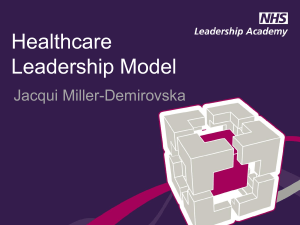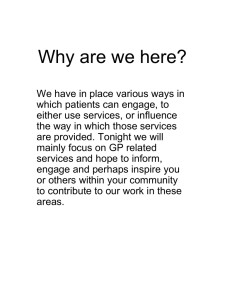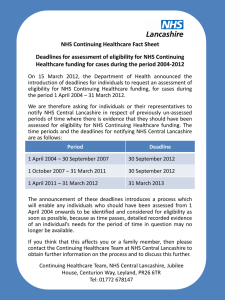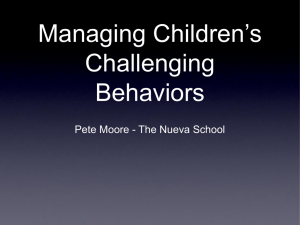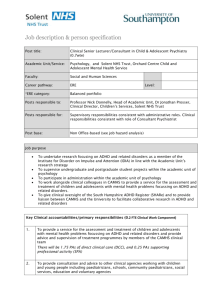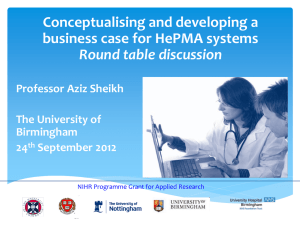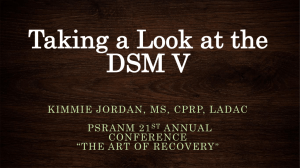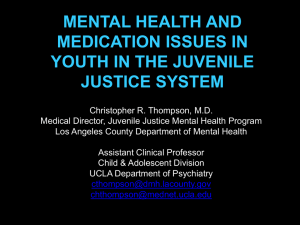Why Mental Health? - Wessex Innovation Resources
advertisement
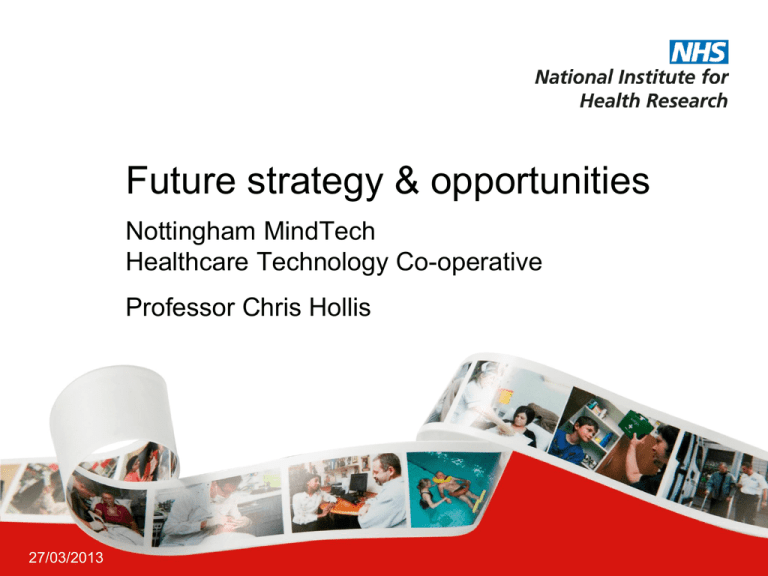
Future strategy & opportunities Nottingham MindTech Healthcare Technology Co-operative Professor Chris Hollis 27/03/2013 NIHR Healthcare Technology Co-operatives (HTCs) Bradford: Wound Prevention & Treatment Leeds: Colorectal Therapies Sheffield: Devices for Dignity Nottingham: Mental Health Cambridge: Brain Injury Birmingham: Trauma Management Barts: Gastrointestinal Disease Guys: Cardiovascular Disease NIHR Healthcare Technology Co-operatives (HTCs) Aims of the NIHR Healthcare Technology Co-operatives are to: • act as a catalyst for NHS “pull” for the development of new medical devices, healthcare technologies and technologydependent interventions • focus on clinical areas and/or themes of high morbidity which have high potential for improving quality of life of NHS patients and improving the effectiveness of healthcare services that support them • work collaboratively with patients and patient groups, charities, industry and academics. NIHR Healthcare Technology Co-operatives (HTCs) Bradford: Wound Prevention & Treatment Leeds: Colorectal Therapies Sheffield: Devices for Dignity Nottingham: Mental Health Cambridge: Brain Injury Birmingham: Trauma Management Barts: Gastrointestinal Disease Guys: Cardiovascular Disease MindTech NIHR HTC in Mental health & neurodevelopmental disorders University of Nottingham Innovation Park 6 Why Mental Health? • Mental health problems affect 1 in 4 people • Huge economic cost to UK - £105bn per year • Largest area of government health spending (13%) • High unmet need with little technological innovation • Subjective clinical assessment dominates practice • Lack of engagement with SMEs 8 Clinical Landscape • Mood Disorders – Unipolar depression – Bipolar depression • Neurodevelopmental disorder – Autism spectrum disorder (ASD) – Tourette syndrome – Attention Deficit Hyperactivity Disorder (ADHD) 9 Current prevalence of mental health disorders in Europe Mental retardation 1.0 opiate dependence 0.4 OCD GAD 0.7 Eating disorder 0.9 Cannabis dependence 1.0 Specific phobia Psychotic disorder 1.2 Personality dis. 1.3 PTSD 1.7 6.4 Social phobia 2.3 2.0 Conduct disorder Agoraphobia 3.0 Alcohol dependence 2.0 3.4 Somatoform disorders 4.9 ADHD 5.0 Dementia Panic disorder 0 5.4 Unipolar depression 6.9 Insomnia 7.0 Anxiety disorders 14.0 0 2 4 1.8 6 8 10 12 14 Wittchen et al 2011 European Neuropsychopharmacology 4 8 12 Why Nottingham? National Leadership - Nottinghamshire Healthcare NHS Trust - Neurodevelopmental and Mood Disorders - Computer Science & Biomedical Engineering Regional Hub - NIHR CLAHRC (NDL) -> CLAHRC East Midlands - East Midlands Academic Health Sciences Network (EMAHSN) - Medilink (East Midlands) Research Strategy • Technology Innovation Pipeline • High quality collaborative projects • User-led design • New partnerships • National resource • Transformation of mental health care and services Bringing Partners Together Nottinghamshire Healthcare Trust NHS ADDISS Biomedical Engineering £330k 1: Institute of Mental Health 2: Technology Transfer Office Medilink HTC University Academics Business School Tourettes Action Patients & Carers Clinicians IMH1 Computer Science £260k £90k Qbtech Ltd Industry TTO2 BuddyApp SMEs Buzz3D Ltd Red Embedded Ltd Organisation NHS Trust Medilink SMEs EMAHSN Steering Committee 3rd Sector Charities Clinicians University Operational Group Neurodevelopmental Disorders Mood Disorders Involvement & Implementation Cross-cutting themes Technology Clinical themes Technology Innovation Pipeline Patients, Clinicians, NHS Trusts Identifying Need Implementation Development NICE/ HTA NICE/ HTA Academics & SMEs Facial affect recognition Automated tic monitoring QbTest BuddyApp Research Approach 1. Identify the clinical problem/ unmet need 2. Identify and develop a technological solution 3. Evaluate clinical/cost effectiveness 4. Adopt and disseminate technology in NHS Target disorders Clinical problem/ unmet need Technology solution Depression ADHD Bipolar disorder Tourette’s ASD PTSD Subjective assessments – time consuming, low diagnostic accuracy • Objective computerised assessment of attention and movement in ADHD Poor treatment adherence/ • SMS text messaging, missed appointments video-telemedicine Lack of real-time objective monitoring of symptoms • Personalised ambient monitoring (PAM) • Objective (real-time) assessment of facial expression, voice, tics Limited efficacy of nonpharmacological interventions • Serious Games: computerised cognitive and social communication training • Virtual reality to treat PTSD, phobias etc. Qb Test: Objective Assessment of ADHD • Computerised assessment of attention and activity • Supports clinical decision making • Provides patients with objective reports on their condition 18 Text messaging app to support therapy Diary: SMS or web Analysis tool Goal reminders Appointment prompts Automated objective assessment of mood and behaviour Valstar et al. (technology theme) Personalised Ambient Monitoring (PAM) User input: • General health questionnaires • Mood selfassessment Wearable Node •Acceleration •General light level •Artificial light level •Ambient sound properties GSM location GPS module XYZ accelerometer Internal accelerometer Bluetooth Encounters* - Bluetooth - 3G / GPRS - User input -Internal Computer vision / visual tracking for automatic tic monitoring & analysis o o o o Face and expression recognition Automatic eye blinks detection Hand and detailed body tracking Integration & tic data analysis Med-e-Tel 2013 22 Games that engage • For diagnosis and treatment • Work with ADHD children shows they will engage with games • Built games to treat but also promote interaction with therapist • Playful environment to get young people to discuss emotional reaction 23 What can we offer ? • Collaboration with SMEs, academics, NHS Trusts • Support to AHSNs and funding agencies; e.g. SBRI, TSB – Clinical expertise – Technology Trials – Patient Public Participation (PPI) – Early stage Health Economics – Advice on NICE assessment procedures – An understanding of clinical pathways – Advice on procurement procedures – Technological expertise & regulatory advice 24 Contacts: Principal Investigator Prof Chris Hollis chris.hollis@nottingham.ac.uk Technology Theme Lead: Prof John Crowe john.crowe@nottingham.ac.uk 25
